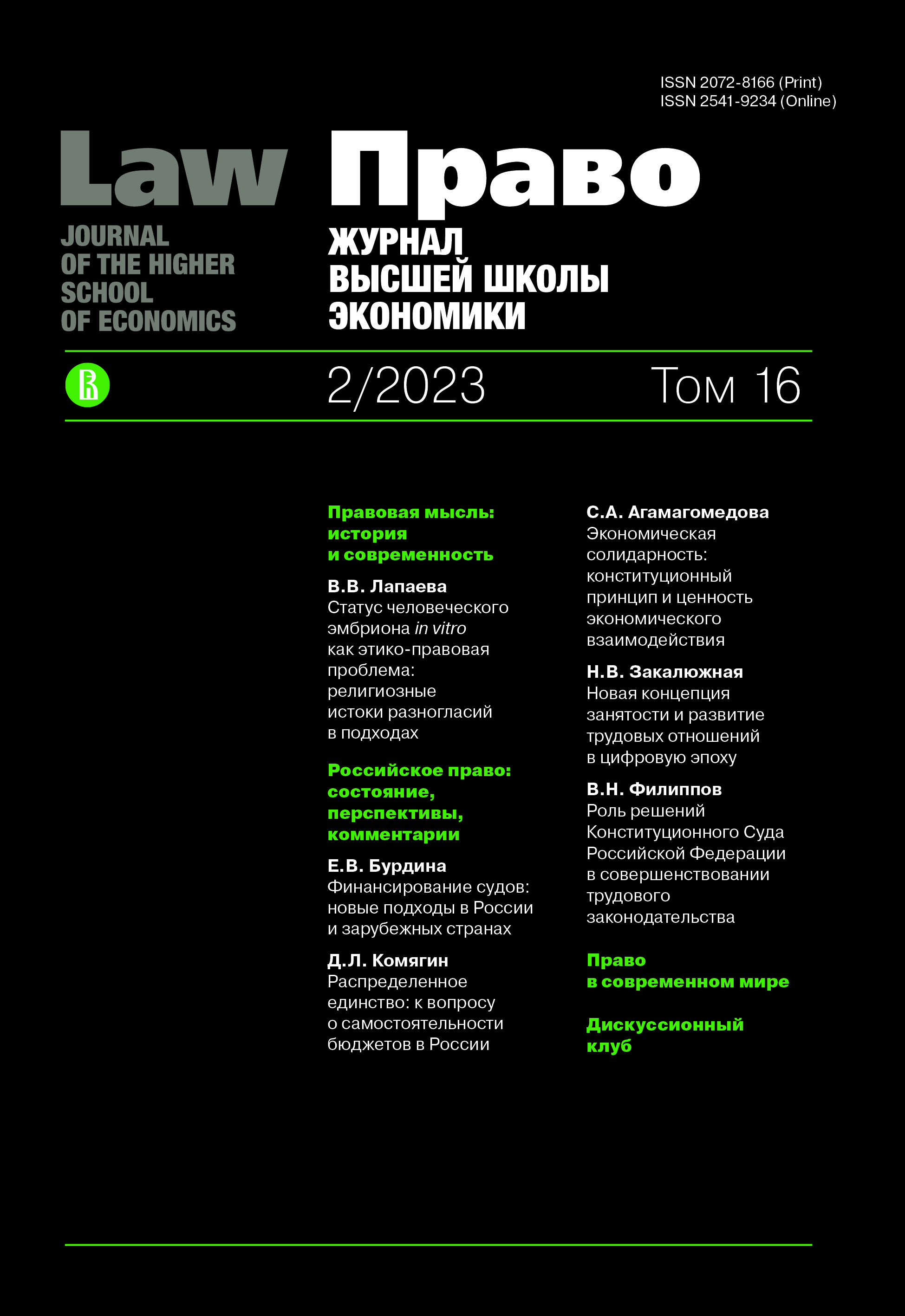Конституционно-правовые формы деятельности депутатов в России: проблемы классификации и реализации
Аннотация
В статье рассматриваются формы депутатской деятельности и полномочия депутатов как непосредственно связанные с конституционной целью реализации депутатского мандата. Законодательное регулирование форм депутатской деятельности неоднократно менялось, в связи с этим появлялись дифференцированные подходы к осмыслению системы форм депутатской деятельности. Целью исследования является классификация форм деятельности депутатов. Формы депутатской деятельности делят на лояльные и оппозиционные, базовые (основополагающие) и контрольные. К базовым формам деятельности относятся: взаимодействие с избирателями и участие в заседаниях представительного органа. К контрольным формам деятельности депутатов относят интерпелляцию, вотум недоверия, резолюцию порицания, парламентское расследование. Автором определяется вид конституционно-правовых норм, устанавливающих полномочия и формы деятельности депутатов. Нормы о полномочиях депутатов, как правило, материально-правовые, в то время как нормы, определяющие формы депутатской деятельности, предопределяют их свободную политическую деятельность. Результатом анализа полномочий и форм депутатской деятельности на федеральном уровне является вывод об обеспечении народного доверия посредством посещения и участия в работе коллегиальных органов государственной власти. Автор обращает внимание на необходимость устранения неточностей при законодательном регулировании понятий «участие в заседаниях» и «участие в работе». Сформулирован вывод о необходимости разграничить понятия «формы депутатской деятельности» и «полномочия депутатов», подчеркивая различия между ними, в том числе путем сопоставления индивидуальных полномочий парламентариев, не связанных с выражением публичной власти. К таковым относятся участие в выполнении поручений палат, организация парламентских слушаний, внесение парламентского или депутатского запроса, обращение с вопросами к членам Правительства. Автор отмечает ослабление роли депутатского запроса как контрольного механизма, преобразование его в обращение к другим бюрократическим инстанциям. В свою очередь депутатское обращение с вопросом к члену Правительства приобретает контрольные функции. Таким образом, демократизм конституционализма, в числе прочего, предопределяется разнообразием индивидуальных и коллективных форм депутатской работы, которые должны быть весьма обширными.Литература
Avakyan S.A. (2007) Gaps and defects in constitutional law and ways to eliminate them. Konstitutsionnoye i munitsipal'noye pravo=Constitutional and Municipal Law, no. 8, pp. 3-12 (in Russ.)
Demidov M.V. (2008) Classification of types and forms of parliamentary control. Vestnik Chelyabinskogo kooperativnogo instituta=Chelyainsk Cooperative Institute Bulletin, no. 2, pp. 129-139 (in Russ.)
Dzidzoev R.M. (2020) Constitutional status of the President of the Russian Federation in the light of the constitutional reform. Konstitutsionnoye i munitsipal'noye pravo=Constitutional and Municipal Law, no. 10, pp. 33-36 (in Russ.) DOI: https://doi.org/10.18572/1812-3767-2020-10-33-36
Ermashenkova S.A. (1990) Party groups in the Soviets of People's Deputies in conditions of the reform of the political system. Candidate of Historical Sciences Summary. Moscow, 21 p. (in Russ.)
Goshulyak V.V. (2018) Forming parliamentarism in the Russian Federation entities. Vestnik Saratovskoy juridicheskoy akademii=Saratov Law Academy Bulletin, no. 3, pp. 15-23 (in Russ.)
Guschina N.A. (2003) Incentive norms of Russian law: theory and practice. Saint Petersburg: University Press, 292 p. (in Russ.)
Kasho V.S. (2010) Organizational forms of the opposition in the system of municipal power. Vestnik Sibirskogo yuridicheskogo instituta MVD Rossii= Siberian Law Institute of Internal Ministry, no. 1, pp. 89-93 (in Russ.)
Krasnov M.A. (2009) May a deputy's request be a mean of parliamentary control? Pravo. Zhurnal Vysshey shkoly ekonomiki=Law. Journal of the Higher School of Economics, no. 4, pp. 16-32 (in Russ.)
Lazarev V.V. (2010) The Russian Parliament as an addressee of decisions of the Constitutional Court. In: Parliamentarism: theory, history, practice. Moscow: Yurlitinform, pp. 54-65 (in Russ.)
Matrosov S.N., Chernysheva A.V. (2020) Parliamentary and deputy requests as forms of parliamentary control. In: State and Municipal Powers in Russia: Conditions and Prospects. Cheboksary: Cooperative Institute Press, pp. 152-156 (in Russ.)
Murashko M. (2020) Speech at the Government hour in the State Duma. Meditsinskaya sestra=Nurse, no. 4, pp. 3-6 (in Russ.)
Narutto S.V. (2017) Interaction of the prosecutor's office with the representative bodies of the Russian Federation entities. Vestnik Akademii General'noy Prokuratury Rossiyskoy Federatsii=Bulletin of General Prosecutor Office Academy, no. 6, pp. 1218 (in Russ.)
Nudnenko L.A. (2003) Regulation of deputy requests in the legislative bodies of Russian Federation. Gosudarstvennaya vlast' i mestnoye samoupravleniye=State Power and Local Self-Government, no. 2, pp. 7-11 (in Russ.)
Sanova L.T. (2009) Basic forms of implementation by deputies of representative bodies of local self-government of their powers. Vestnik Krasnodarskogo universiteta MVD Rossii=Krasnodar MVD University Bulletin, no 1, pp. 57-58 (in Russ.)
Svistunova L.Yu. (2014) Constitutional consolidation of parliamentary hearings in the norms of federal and regional legislation. Politematicheskiy elektronnyy zhurnal Kubanskogo agrarnogo universiteta=Electronic Journal of Kuban Agrarian University, no. 99, pp. 1-17 (in Russ.)
Taeva N.E. (2010) Types of constitutional law norms of the Russian Federation. Moscow: Elit, 264 p. (in Russ.)
Trukhanova D.S. (2020) The government hour as a communicative event in the Russian-language parliamentary discourse. Verkhnevolzhskiy filologicheskiy vestnik=Upper Volga Philology Bulletin, no. 1, pp. 94-103 (in Russ.) DOI: https://doi.org/10.20323/2499-9679-2020-1-20-94-103
Tkhabisimov K.A. (2017) The main forms of implementation by a deputy of a representative body of local self-government of his powers and maintaining professional level of his activity. In: Constitution and Constitutional Legality. Pyatigorsk: University Press, pp. 76-84 (in Russ.)
Copyright (c) 2023 Право. Журнал Высшей школы экономики

Это произведение доступно по лицензии Creative Commons «Attribution-ShareAlike» («Атрибуция — На тех же условиях») 4.0 Всемирная.


















